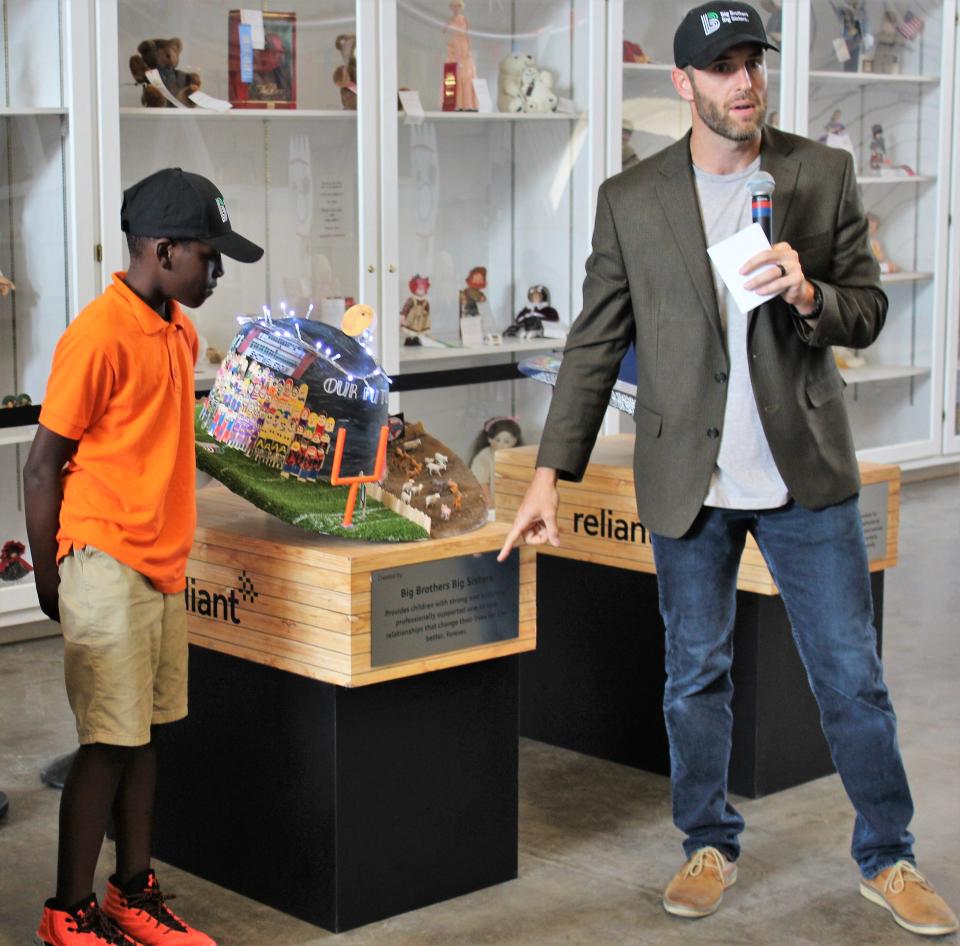Convicted driver's past offenses detailed in punishment phase in Rogers' death
The punishment phase in the trial of James Arthur Wells Jr. for the intoxicated manslaughter death of Mark Rogers in March 2021 began Friday, with the prosecution introducing an arrest just prior to the crash and the defense describing Wells as an Army veteran battling pain for years.
Wells, on Thursday afternoon, was found guilty of causing a March 13, 2021, collision on State Highway 36 just south of Abilene that killed Rogers when Rogers' pickup was knocked off the road by the impact and hit a tree.

The state proved its case that Wells was under the influence of two drugs - Ezitalam and Flazapam - at the time. Driving a Dodge Challenger at speeds of more than 125 mph, Wells was attempting to pass the Rogers pickup in a no-passing lane when oncoming traffic forced him back into the northbound lane. He couldn't brake to avoid the collision.
In addition to a guilty finding on intoxicated manslaughter, Wells was found guilty on one count of aggravated assault for injuries to Hope Rogers, a passenger and Rogers' 10-year-old daughter, in the back seat. The jury agreed with the prosecution that Wells' vehicle was a deadly weapon.
On Friday, the state hoped to increase the intoxication manslaughter to a first-degree offense, thus providing for a longer prison term for Wells.
Before the jury and Judge Jeff Propst arrived in the 104th District Courtroom, Wells sat forward in his chair, his hands clasped in front of his face. Later, his head was against his hands on the table.
Behind him sat six family members, one of whom testified Friday - his wife, Elisa.
Wells did not testify during the trial, and when asked Friday by his attorney, Taylor Ferguson, if he declined to do so during punishment, he nodded in agreement.
Also testifying Friday was Brad Rogers, one of two older brothers of Rogers, 39, who was the local president of Big Brothers Big Sisters Lonestar.
After witnesses were called, Propst ordered an early lunch to prepare his documents for the jury to consider in their punishment deliberation. The trial was to resume at 1:30 p.m. with attorneys giving final remarks.
∎ Go to reporternews.com for updates on the trial.
From the prosecution
Hicks got to the point.
The trial was about facts; punishment is more about character.
Hicks and Erin Stamey, who is assisting, brought into evidence Friday of prior incidents involving Wells.
Those included a sexual assault before he began a relationship in Phoenix with the woman he married in 2011 and serving three years probation in Arizona for his role in bringing immigrants illegally into the U.S. He completed that probation before the couple, with their two children, moved to Texas in February 2021.
They came to Cameron, which is east of Belton, where Wells' father lived. Testimony on Friday showed Wells' mother had died, leaving his aging father alone.
On March 10, 2021, Wells was stopped by a Cameron police officer for driving without lights in the city limits at 9:45 p.m. The family lived with his aunt and uncle outside of town in a trailer.
Officer Stephen Wall testified Friday that he was responding to a "reckless driver" report. After he made his stop, he believed Wells was under the influence, though not alcohol. He believed it to be narcotics.
He said Wells had trouble following his simple instructions, such as producing a driver's license.
The two Wells children, both under the age of 15, where in the back. There, the officer found Elisa Wells, also impaired in her responses and one leg was twice the size of the other.
The officer learned from the children, who were 11 and 12, that she had been struck by the car.
The jury would hear that she had been hit by Wells outside their home. She said she had lost her sandal getting in the passenger seat and Wells did not hear her ask to hold on while she got it.
The officer learned that had occurred 30 minutes prior and that Wells, if he was going to a hospital, was going the wrong direction. He was going east, not to the nearest hospital in Temple, 30 or so miles to the west.
Wells consented to a blood test, Wall said. Wells' wife was taken by ambulance to the hospital and the children were given over to family. Later, they would be turned over to Child Protective Services.
Hicks noted the car that Wells was driving that night was the same 2011 Dodge Challenger he was driving three days later when he crashed into Rogers in Abilene.
The family was out that night with plans to travel to Abilene to see Wells' sister.
While his wife was in the hospital. Wells made that trip alone.
"This is a guy who doesn't care," Hicks said.
A toxicology expert testified that tests showed the presence of drugs not available by prescription or over the counter in the U.S. and other countries. That finding is similar to what came into testimony during the trial concerning the fatal crash near Abilene three days later.
Dana Baxter in her testimony said that one of those drugs, which she offered could be purchased on the street, was harmful enough. She said the source of these kinds of "designer drugs" usually is unknown. However, combining drugs provides an "added effect." And if something is added, such a fentanyl, the impairment effect is further increased.
Later, Ferguson asked if a person obtaining this kind of drug would know what was in it, and Baxter said no.
In closing, Hicks asked the jury if they had ever determined that someone needed to be put away before they killed someone.
Wells has killed someone, he said, and, "He's going to kill somebody else."
From the defense
In his opening remarks, Ferguson said Wells was an Army veteran who followed his father, also in the Army, into service.
During his service, Wells was injured. Elisa Wells later testified he had hurt his wrist, neck and back after he was "blown off a truck." He had surgery, took medication and received counseling. He lived in Phoenix because, she said, the Veterans Administration hospital there is highly regarded.
The couple met in 2010 (she said at a bus stop), married and had a boy and girl.
Elisa Wells testified that her husband was in constant pain. He took medication, including Oxycodone.
Cameron was a good place to live because it was near a VA hospital.
Questioned later by Hicks, Elisa Wells said she too had a drug problem, abusing pain killers. She said he has been "clean and sober" since March 10, 2021, when she was struck accidentally, she said, by her husband.
Asked if Wells was a good man, she said, "Most definitely. He was a good husband and father."
Hicks objected during Ferguson's questioning of his witness. After twice being warned by Propst for leading his witness, Ferguson rested.
Hicks asked Elisa Wells if her life has been better since March 10, 2021, because she has worked out her own issues and because she has been separated from her husband. They have had contact, it was noted.
Yes, she said, hesitantly.
Hicks also noted that Wells, while in jail in Abilene, has not had access to the drugs had been taking and he seems to be doing well without legal medication. Only jail personnel could administer that medication.
She agreed, though Ferguson confirmed Wells could receive the medicine if needed.
Brother remembers Mark Rogers
Brad Rogers on the stand listed the community involvement of his younger brother.
Besides working for Big Brother Big Sisters and being a Big Brother to a youngster named Jacob, Mark Rogers was a founder of World's Okayest Mom (a nonprofit that supports mothers), a campus minister at Southern Hills Church of Christ with his wife, Jenn, a Kiwanian and a former football player who continued in his athletic endeavors. Besides taking on triathlons himself, he worked with others to keep them healthy.
Rogers, too, was involved with YoungLife.

Brad Rogers said his brother was called "the mayor" because he seemed to know everyone and everyone knew him.
He was known for sending handwritten messages to others.
"He loved his community and he loved people," Brad Rogers said.
Despite his busyness, he had a morning routine with his children and would read and play his guitar with them at night, he said.
As for Jacob, the Little was able to graduate, thanks to his Big.
This article originally appeared on Abilene Reporter-News: Driver's past offenses detailed in punishment phase in Rogers' death

